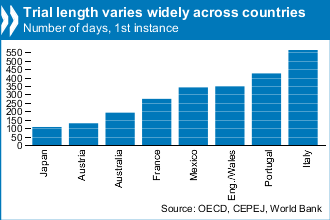2013-06-21
OCDE: melhor justiça cível potencia investimentos, competitividade, inovação e crescimento
«Well-functioning judicial systems play a crucial role
in determining economic performance – notably by guaranteeing the
security of property rights and the enforcement of contracts – but not
all countries’ judiciaries operate at the same level of efficiency.
New OECD research provides cross-country comparison
on the wide variation in judicial efficiency in 24 jurisdictions
worldwide, including measures of trial length, accessibility to justice
services and the predictability of decisions. What Makes Civil Justice Effective? details
potential scope for improving the functioning of justice systems,
through wider use of information technology, reductions in litigation
and lowering the rate of appeals.
 |
Protection of property rights and enforcement of
contracts encourage savings and investment while promoting the
establishment of economic relationships, bringing positive impacts on
competition, innovation, the development of financial markets and
growth, according to the report.
Lengthy civil proceedings can be a drag on economic
activity. The average length of first instance proceedings is around 240
days in the OECD area, but in some countries a trial may require
almost twice as many days to be resolved, according to the report. Final
disposition of cases may involve a long process of appeal before the
higher courts, which in some cases can last more than 7 years.
Differences in trial length appear to be more related to the structure
of justice spending and the structure and governance of courts than to
the sheer amount of resources devoted to justice. |
Factors associated with shorter trial length include:
- larger shares of the justice budget devoted to court computerization;
- the active management of the progress of cases by courts;
- the systematic production of statistics at the court level;
- the existence of specialised commercial courts;
- systems of court governance in which the chief judge has broader managerial responsibilities (e.g. covering supervision of staff and administration of the budget).
There is wide scope for further informatisation of
court activities, according to the study. The majority of courts in OECD
countries have electronic forms, websites and electronic registers, but
many countries have not yet implemented online facilities and the
possibility for lawyers to follow up cases online, or have done so only
in a minority of courts. Investments in court computerisation lead to
higher productivity of judges (measured as cases solved per judge),
especially in countries where computer literacy is widespread.
Reducing high litigation rates can increase civil justice efficiency. Good quality regulation, timely and effective implementation of policies, integrity of the public sector and free negotiation of lawyers’ fees (as opposed to regulation) could all be important instruments for reducing litigation. Lowering the number of new litigation cases per capita – which range across countries from almost 10 cases to less than one case in 100 people – is associated with a significant reduction in the average length of trials.
In many countries there is also scope for reducing appeal rates, a simple measure of the predictability of court decisions. Appeal rates are lower in countries where filing an appeal is subject to obtaining permission (leave). However, as restrictions to appeal imposed by law do not explain all cross-country differences in appeal rates, there would seem to be scope for increasing predictability of court decisions (leading to lower appeal rates) without tightening restrictions.»
Reducing high litigation rates can increase civil justice efficiency. Good quality regulation, timely and effective implementation of policies, integrity of the public sector and free negotiation of lawyers’ fees (as opposed to regulation) could all be important instruments for reducing litigation. Lowering the number of new litigation cases per capita – which range across countries from almost 10 cases to less than one case in 100 people – is associated with a significant reduction in the average length of trials.
In many countries there is also scope for reducing appeal rates, a simple measure of the predictability of court decisions. Appeal rates are lower in countries where filing an appeal is subject to obtaining permission (leave). However, as restrictions to appeal imposed by law do not explain all cross-country differences in appeal rates, there would seem to be scope for increasing predictability of court decisions (leading to lower appeal rates) without tightening restrictions.»
Fonte: OCDE
Etiquetas: Código de Processo Civil, economia portuguesa, OCDE, reforma da justiça, reforma do processo civil
